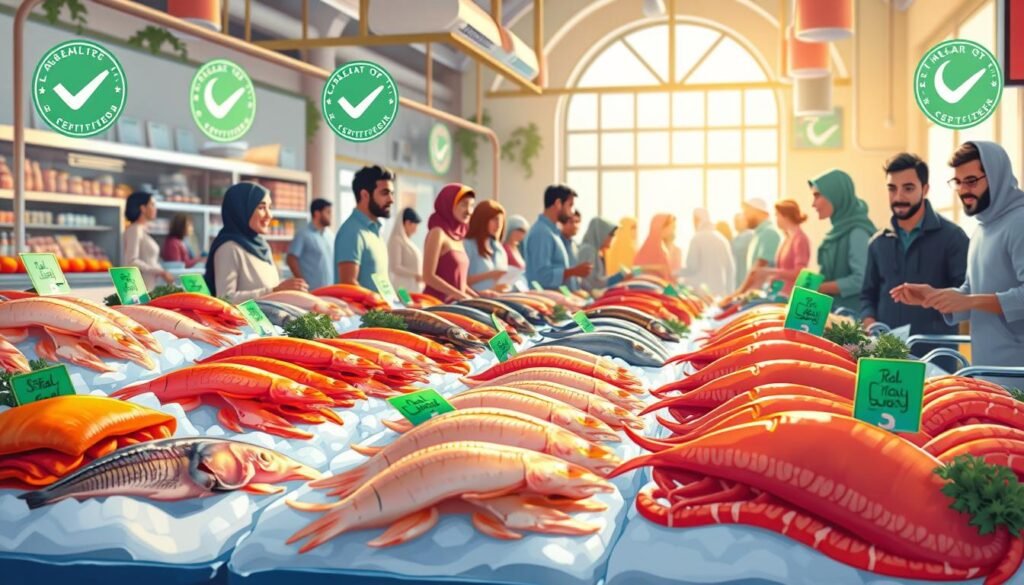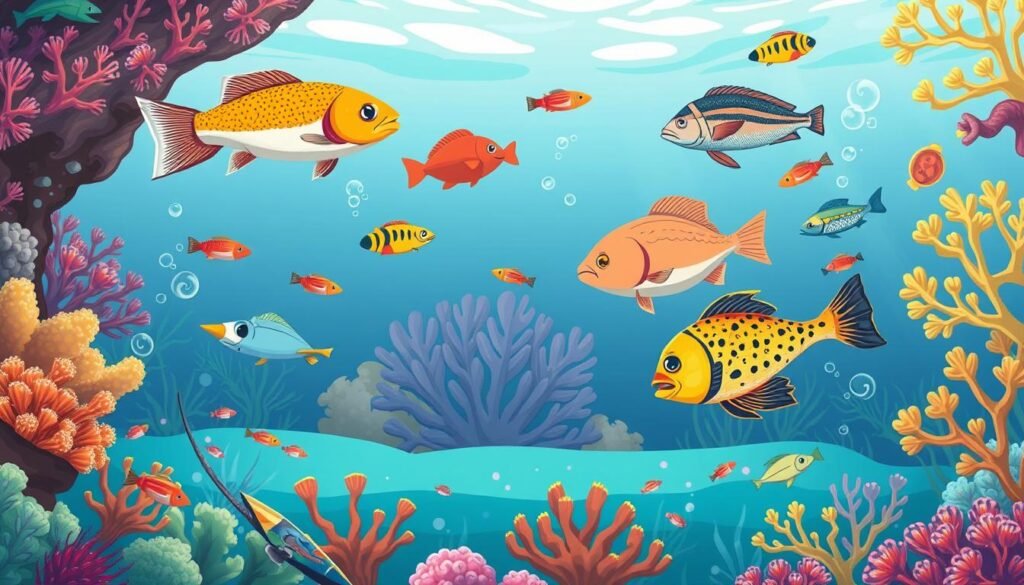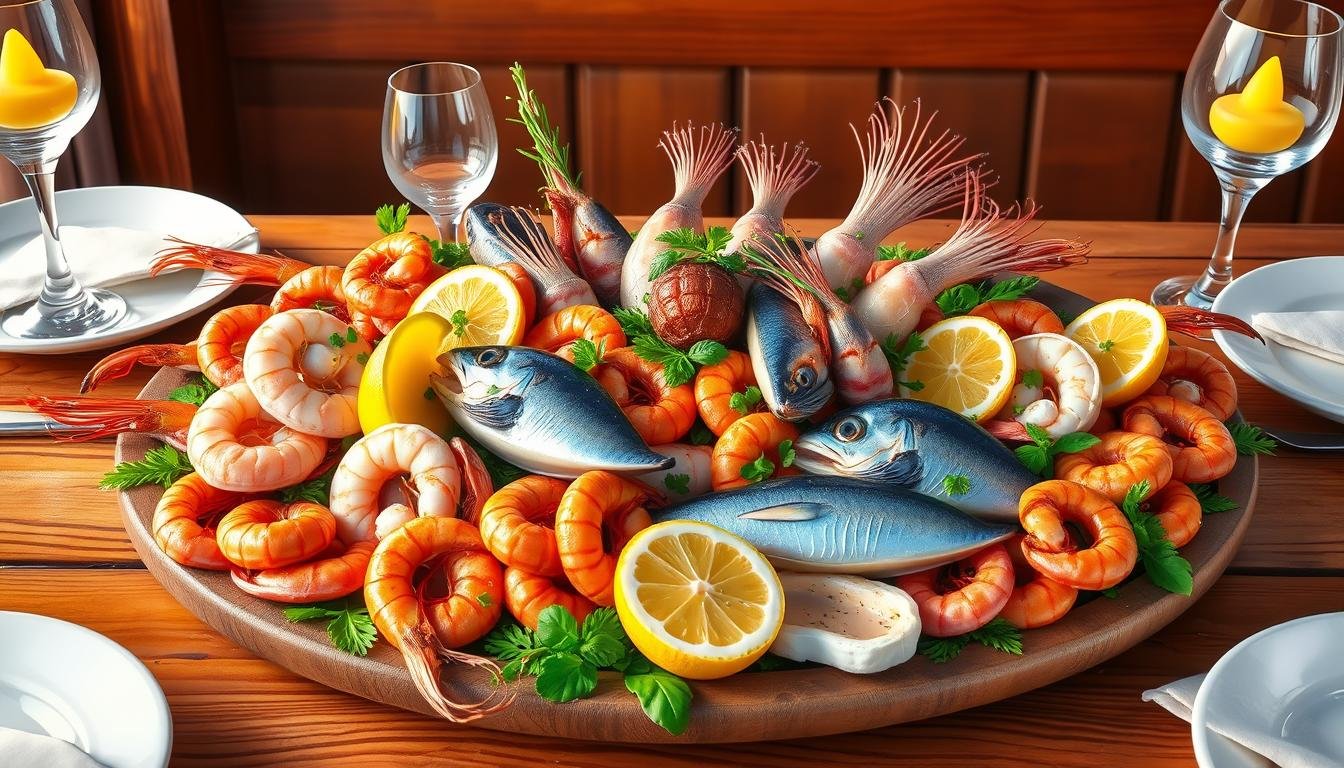Is seafood really okay for Muslims, or is there confusion? The question ties to Islamic laws in the Qur’an. It’s key to understand what’s allowed and what’s not with seafood and Islam.
Let’s look into the rules about seafood for Muslims. We’ll see what different schools of thought say. This includes looking at exceptions that might change our views.
Understanding Halal Dietary Laws
Halal dietary laws guide Muslims on what they can eat. They come from the Qur’an and Hadith. These Islamic food laws aim to keep both body and soul clean.
Anything good for you is halal. But, anything bad is haram. Knowing these dietary regulations helps pick the right foods.
The word ‘halal’ means more than just food. It covers how food is made and eaten. This rule makes sure Muslims can eat a wide variety of foods.
Aquaculture is big in seafood, with over 50% coming from farms. This means a lot of demand for halal seafood. Big brands like Peter Pan Seafood now offer Halal-certified salmon.
As the world changes, knowing halal laws is more important. In the European Union, fish can eat animal protein from pigs and poultry. This can make some seafood not halal.
When picking seafood, it’s key to know the Islamic food laws. Different schools have different views, like on squid and crustaceans. Learning about halal laws is a journey of discovery and following your values.
Qur’anic Perspective on Seafood
The Qur’an gives us insights on eating seafood. Verse 5:96 says, “Lawful to you is (the pursuit of) water-game and its use for food.” This shows that many sea creatures, including seaweed, are okay for Muslims to eat. Scholars like Ibn ‘Abbas say that both living and dead sea animals are halal.
The Hanafi school is more careful. They say fish with scales are okay, even if they’re dead. But fish without scales can be tricky. For example, salmon is halal if caught alive and cooked right away. Catfish and eels need to be killed gently to be eaten.
Sushi can be halal, depending on what’s in it and how it’s made. Having halal certification is important for many people. Some seafood, like lobster and crab, are debated. Shia scholars might say lobster is not okay, but opinions on crab vary.
Big sea animals are also complex. Whale meat is okay for some, but shark meat is a big debate. Tuna is mostly accepted, but some species are different. Shrimp and prawns are usually halal, but oysters might be too. Creatures like crocodiles and frogs are not allowed.
Looking into the Qur’an’s view on seafood shows it’s not simple. For more details, click here. The rules on seafood show how important it is to follow the Qur’an’s teachings.
Can Muslims Eat Seafood?
Seafood in Islam is mostly okay to eat. The Qur’an says it’s fine to eat seafood. Most seafood, like fish with scales, is halal. This is true for many Muslims, thanks to the Hanafi school of thought.
General Permissibility of Seafood in Islam
Fish like salmon, tuna, and shrimp are good choices. But, some seafood is not allowed. For example, frogs and crocodiles are not okay because they live on land.
Eels and catfish are okay if they are slaughtered the right way. Mackerel and trout are also good choices. Even sea snakes, otters, and turtles can be eaten under certain rules.
Exceptions to the Rule
Even though most seafood is okay, there are some exceptions. Octopus and calamari are not always agreed upon. Shellfish like lobsters and crabs also cause debate.
It’s important to remember verses like al-Nisa’ 4:29 and al-Baqarah 2:195. They tell us to avoid harm. This means being careful with seafood that could be dangerous.
Popular Seafood Options Among Muslims
Seafood is special in Muslim cuisine, known for its taste and health benefits. Many Muslims choose seafood because it’s easy to find and tastes great. Seafood choices vary by culture and where you live.
Fish as a Preferred Source of Protein
Fish is a top pick for Muslims because it’s full of protein and good for you. It’s easy to cook and doesn’t need complicated halal meat steps. People grill or fry fish in many ways, showing off their cooking skills.
Seafood is also known for its omega-3 fatty acids. This is important to Muslims who care about healthy eating.
Variations in Seafood Consumption by Region
Where you live affects what seafood you eat. Near the coast, you’ll find fish curries and grilled prawns. But inland, choices are fewer because of distance.
Knowing these differences helps us appreciate different cooking styles. In the U.S., cities are now serving more halal seafood. This shows how Muslim food choices are changing.
Processed vs. Fresh Seafood: What Muslims Should Know
In today’s world, choosing between processed and fresh seafood matters a lot for Muslims. They want to follow halal food safety. Fresh seafood from good sources is often trusted. But, processed seafood can be tricky.
Knowing the difference helps Muslims make choices that fit their faith.
Challenges with Processed Seafood Products
Processed seafood can make Muslims wonder if it’s halal. Some additives might not be okay for Muslims. Also, making it can lead to contamination, which is a big no-no.
It’s key to check labels well. This way, you know if it’s safe to eat.
Looking at halal processed products, knowing where they come from is important. Places that say they’re halal should really check their products. Fresh seafood is usually okay if it’s from a reliable place. But, it’s up to you to pick what’s right for your diet.
Halal Certification and Its Importance
Halal certification is key in today’s global market. It’s important for both consumers and businesses, mainly for certified halal seafood. This certification proves that food meets Islamic dietary laws.
As more Muslims live around the world, the need for halal food grows. This demand drives billions of dollars in spending on halal products each year.
Halal certifiers are very important. They work with Islamic scholars and food makers. They make sure food processing follows halal standards.
Certified halal seafood is popular, not just among Muslims. It’s also a premium choice in places with fewer Muslims. Getting this certification can help a company grow its market share and attract more customers.
The Role of Halal Certifiers
Halal certifiers check if products are truly halal. Companies like Peter Pan Seafood show they care about Muslim dietary needs. This builds trust and opens up new markets in areas with lots of Muslims.
The value of halal certifiers is huge. They help make sure food is halal. This lets people enjoy their meals without worry.

Different Schools of Thought on Seafood Consumption
In Islam, there are many views on eating seafood. These views come from different Islamic schools of thought. The Sunni Shia seafood debate shows how diverse Muslim teachings and practices are. It also shows how culture affects what we eat.
Sunni vs. Shia Perspectives
The four main Sunni schools have their own views on seafood. Imam Ahmad Ibn Hanbal and Imam Shafi say all sea creatures are okay to eat. This includes shrimp, oysters, and crabs.
Imam Malik says most seafood is fine, except for eel. But the Hanafi school only allows fish. They say other sea creatures are not allowed or are frowned upon.
The Shia view, like the Hanafi, only allows fish with scales. This means no shellfish, octopus, or squid. Fish like salmon and tuna are okay for both Sunnis and Shias. But fish like catfish and eel have different opinions based on the school.
Today, talking about halal seafood is more than just reading old texts. We also think about ethics, sustainability, and getting things certified as halal. As we learn more about seafood in Islam, Muslims try to follow their faith and eat right.
The Impact of Aquaculture on Halal Seafood
Aquaculture, or fish farming, is now a big part of our seafood. It makes up over 50% of what we eat. But, it also brings up aquaculture halal issues for Muslim eaters. Even though farmed seafood seems halal, its true origins can make people doubt if it’s okay to eat.
Fish farms often don’t meet the standards of Tayyib. They are too crowded, dirty, and the fish are not killed humanely. This harms the fish and makes halal seafood practices questionable. The fish suffer from stress, disease, and don’t eat well because of the bad conditions.
Studies show that starving fish before certain actions doesn’t hurt them. But, the harm to the environment from fish farming is big. The leftover food and waste pollute, and antibiotics can make bacteria resistant. This makes sustainable fishing harder.
In Indonesia, fish gets halal certified to meet Islamic rules. Groups like the Indonesian Ulema Council (MUI) help. They make sure the fish is processed right. This makes the fish safer and more trusted by Muslim buyers.
Looking at aquaculture and halal seafood, we see a big challenge. We need to find a way to meet demand while keeping things ethical and religious. It’s key for buyers to choose farms that are both sustainable and follow halal rules.
Health Considerations: Allergies and Poisonous Fish
Seafood is not without risks. Seafood allergies can cause a range of symptoms, from mild to severe. People with allergies should talk to doctors before eating different seafood.
Some fish, like pufferfish, are poisonous. Eating them can lead to serious health issues or even death. For Muslims, avoiding harmful seafood is key. It’s about following Islamic principles and staying safe.
Choosing seafood wisely is important. Knowing about allergies and harmful fish helps us make better choices. It shows we care about our health and follow halal guidelines.

Culinary Practices and Seafood in Muslim Cultures
Seafood in Muslim cultures shows both diversity and unity. It brings together flavors and traditions that unite communities. From South Asian fish curries to Middle Eastern grilled fish, seafood is key in Muslim cuisine.
Each dish is more than just food. It’s a way to remember our heritage and faith. It reminds us of who we are as we share meals together.
Exploring seafood in Islamic traditions reveals its deeper meaning. Traditional recipes connect families and friends, strengthening bonds. Preparing and sharing seafood dishes is spiritual, following halal dietary rules.
Halal seafood choices, like salmon and cod, show a deep understanding of Islamic teachings. This understanding is important for Muslims worldwide.
With over 2 billion Muslims, the demand for halal seafood is growing. This demand makes halal seafood more available. It also creates a market that respects Muslim values.
By celebrating seafood culinary practices, we honor our shared identity. Every meal becomes a celebration of who we are and what we aspire to.
FAQ
Can Muslims eat all types of seafood?
What are the halal dietary laws concerning seafood?
Are there any exceptions to seafood permissibility in Islam?
How does the Qur’an address seafood consumption?
What role does halal certification play for seafood products?
Why is fresh seafood preferred over processed seafood?
How do different schools of thought interpret seafood consumption?
What health considerations should Muslims be aware of when consuming seafood?
How has aquaculture impacted halal seafood practices?
How does seafood feature in the culinary practices of Muslim cultures?

Embracing Faith, One Insight at a Time!
The teachings of the Quran have always guided my path. With a deep passion for Islamic knowledge, I strive to blend the wisdom of tradition with the relevance of today, making the timeless messages of Islam accessible and meaningful for everyone.
Muslim Culture Hub is my platform to share historical insights and thought-provoking articles, exploring both well-known and lesser-discussed aspects of Islamic culture and beliefs. My mission is to create an inclusive online space where everyone can learn, strengthen their faith, and connect with the profound message of Islam.
Join the journey!
May peace be upon you.








